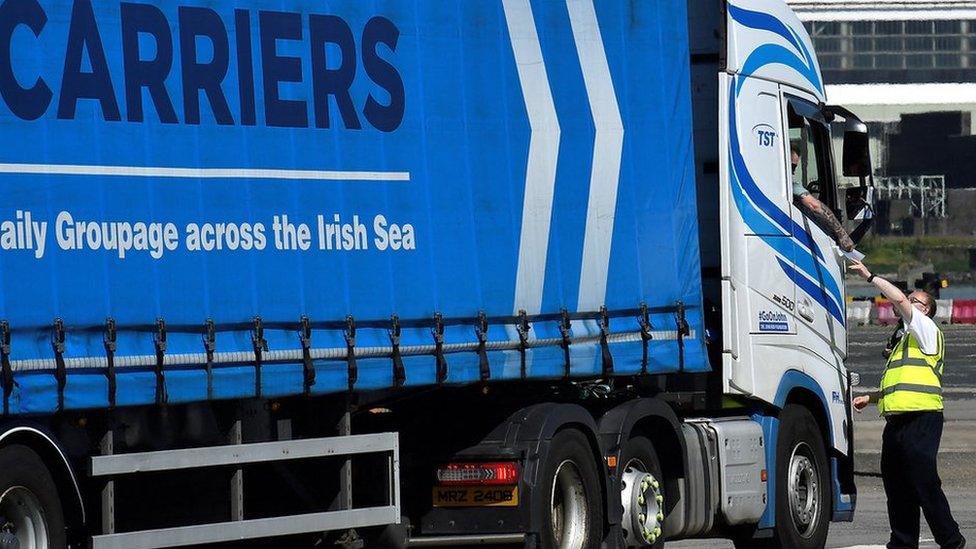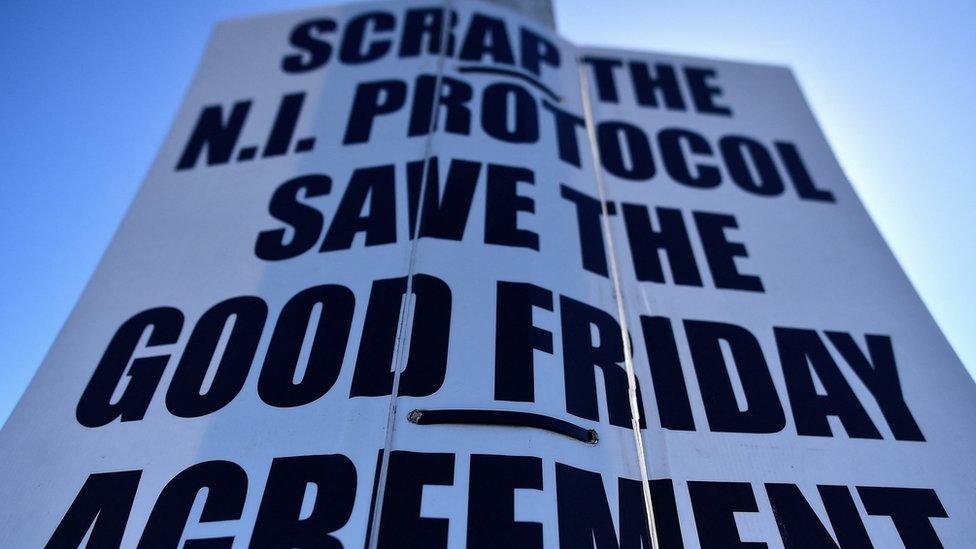Northern Ireland Protocol: UK defies EU legal action over checks
- Published

The UK has told the EU it will continue delaying customs checks on goods moving from Great Britain to Northern Ireland, despite legal action from Brussels over the Northern Ireland Protocol.
The EU is considering its next steps.
The protocol keeps Northern Ireland in the EU's single market for goods, avoiding the need for a hard border with the Irish Republic after Brexit.
The prime minister is expected to meet European Commission president Ursula von der Leyen for talks next week.
It is thought they will speak when they both attend the United Nations General Assembly in New York.
Despite normal politics being paused after the Queen's death last week, the UK responded to the Commission's legal action ahead of the EU's deadline of the end of Thursday.
The EU has launched a series of lawsuits over what it sees as the UK's failure to comply with checks on the movement of farm produce from Great Britain to Northern Ireland.
It has also started legal action over legislation that would allow the UK to alter the protocol, introduced by Liz Truss when she was foreign secretary.
However, the UK government argues "grace periods" delaying full customs checks should remain in place.
European Commission spokesman Daniel Ferrie said: "I can confirm we have received a reply from the UK. We will now analyse the reply before deciding on the next steps."
The Commission could refer the case to the European Court of Justice, but its initial reaction is expected to be muted following the death of Queen Elizabeth II.


Brussels has been making plenty of overtures about restarting negotiations, previously stalled, on how to reform the post-Brexit treaty.
The new government's desires are less obvious, although Prime Minister Liz Truss is very familiar with the row.
As foreign secretary she set in train a bill that could see Britain override parts of the protocol; something the EU sees as a clear and blatant breach of a mutually agreed treaty.
EU diplomats believe Ms Truss's approach to the protocol was, at least in part, designed to woo the right wing of her party when a leadership contest loomed.
Now that she's prime minister, what will she decide to do?
With talk of a phone call or meeting between EU chief, Ursula von der Leyen and Ms Truss, maybe that question will be answered before long.
Both will attend Queen Elizabeth II's funeral, but a more likely opportunity for a political discussion could be next week's UN General Assembly in New York.

The protocol was part of the Brexit withdrawal agreement, agreed between the UK and the EU in December 2019.
Special trading arrangements were required for Northern Ireland because it has a land border with the Republic of Ireland, which is in the EU.

The EU has strict food regulations and demands border checks when certain goods - such as milk and eggs - arrive from non-EU countries.
The UK and the EU also agreed that protecting the Northern Ireland peace deal, the 1998 Good Friday Agreement, was essential.
From 2021, the protocol has meant some new checks on goods moving from Great Britain to Northern Ireland.
Unionist politicians have condemned what they regard as the imposition of a trade border in the Irish Sea.
Northern Ireland's devolved executive has been suspended since February, and the largest unionist party, the DUP, has refused to resume sharing power with nationalists until the protocol is significantly reformed.
Polls have suggested overall opinion in Northern Ireland on the protocol is fairly evenly split.
The Northern Ireland Protocol Bill would allow the UK government to override the arrangements for Northern Ireland it signed up to.
It cleared the House of Commons in July, but is expected to face stern opposition when it begins its passage through the House of Lords next month.